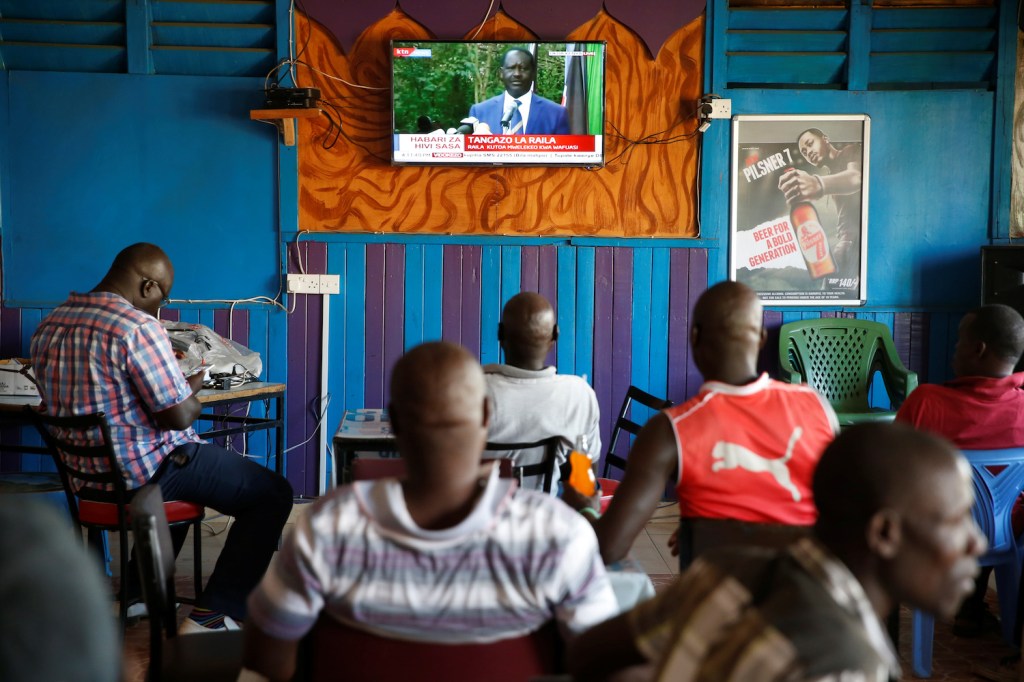After a top Kenyan politician said Sunday that the country has “no room for gays,” a government spokesman doubled down on the anti-LGBT sentiment, saying homosexual relations are “unnatural and un-African.”
Deputy President William Ruto made the anti-gay comments at a church service in Nairobi. His speech, delivered in Swahili, was caught on camera. “The Republic of Kenya is a republic that worships God,” he said. “We have no room for gays and those others.”
Videos by VICE
Congregants at the Jesus Winner Ministry Church, which is known for attracting members of the country’s elite, reportedly applauded as Ruto spoke. “We will not allow homosexuality in our society as it violates our religious and cultural beliefs,” he said. “We will stand with religious leaders to defend our faith and our beliefs.”
Ruto’s spokesman Emmanuel Talam later stood by the sentiment, telling Reuters “the government believes that homosexual relations are unnatural and un-African.”
Kenya has had anti-gay laws on the books since achieving independence from Britain in 1963, and is currently one of 36 countries in Africa where homosexuality is illegal. Unlike Mauritania, Sudan, and parts of Nigeria and Somalia, Kenya does not make homosexual acts punishable by death.
Gay rights activist and author Binyavanga Wainaina slammed Ruto’s comments. “Our Deputy President Ruto is building himself to be the most dangerous man in Africa. If his strategy works, much will burn,” Wainaina tweeted.
Related: Somali Government Orders Journalists to Rename Militant Group.
Ruto is currently facing charges at the International Criminal Court for alleged crimes against humanity connected to post-election ethnic violence that occurred in Kenya in 2007 and 2008.
Politicians in religiously conservative African countries often assume anti-homosexual stances to woo voters, but Ruto emphasized Sunday that his inflammatory statements were not a political ploy. “When we say this, we are not saying so as to get votes but to protect what we all believe is right,” he said.
Jeffrey Smith, and advocacy officer at the Robert F. Kennedy Human Rights, called Ruto’s comments highly irresponsible, particularly for someone who has been investigated for hate speech in the past.
“Not so long ago, this sort of hateful rhetoric has had very serious consequences in Kenya, and it’s a shame the lessons have not been learned,” Smith told VICE News. “During this difficult time in Kenya, one would hope that its political leaders would cultivate national unity rather than serving up reckless rhetoric meant to tear people apart.”
Ruto’s remarks coincided with US Secretary of State John Kerry’s arrival in the country on a tour that includes stops in the capital city of Nairobi, and the country of Djibouti. Kerry was photographed Sunday spending time with orphan elephants in a Nairobi National Park. More than a month after the deadly attack by al Shabaab gunmen that killed 147 people at Kenya’s Garissa University College, Kerry also reaffirmed his support for the country’s fight against terrorism.
Kerry addressed Ruto’s comments Monday, reaffirming the White House’s opinion on gay rights in Africa. President Barack Obama’s administration previously laid heavy criticism on Uganda, the Gambia, and other nations that have enacted anti-gay legislation.
“The US believes that all people are created equal and all people have rights, that includes people of every faith, every gender, every choice of partner, no matter who you love,” Kerry said during a press conference.
Related: Human Rights Groups Caught in the Crossfire After Kenyan University Attack.
While Kenya remains socially conservative, the country has made strides for gay rights both legislatively and judicially. Just last week, a Kenyan court ruled that a government agency must recognize a gay rights organization due to a constitutional provision that seeks to preserve minority rights. The decision by Kenya’s High Court was the result of a government agency’s refusal to accept activist Eric Gitary’s 2013 request to register the names of various gay rights associations, including the Gay and Lesbian Human Rights Council and the Gay and Lesbian Human Rights Observancy.
The court’s three judges said the “constitution is supreme,” and that the government “cannot rely on religious texts or its views of what the moral and religious convictions of Kenyans are to justify the limitation of a right.”
In August 2014, Kenya’s Committee on Justice and Legal Affairs cited constitutional grounds for shutting down a bill that would have made same-sex relations punishable with life imprisonment for Kenyan citizens, or public stoning for foreigners. Homosexual acts remain illegal, however, and carry a maximum prison sentence of 14 years, though authorities have yet to make a single conviction under the law.
Follow Kayla Ruble on Twitter: @RubleKB



